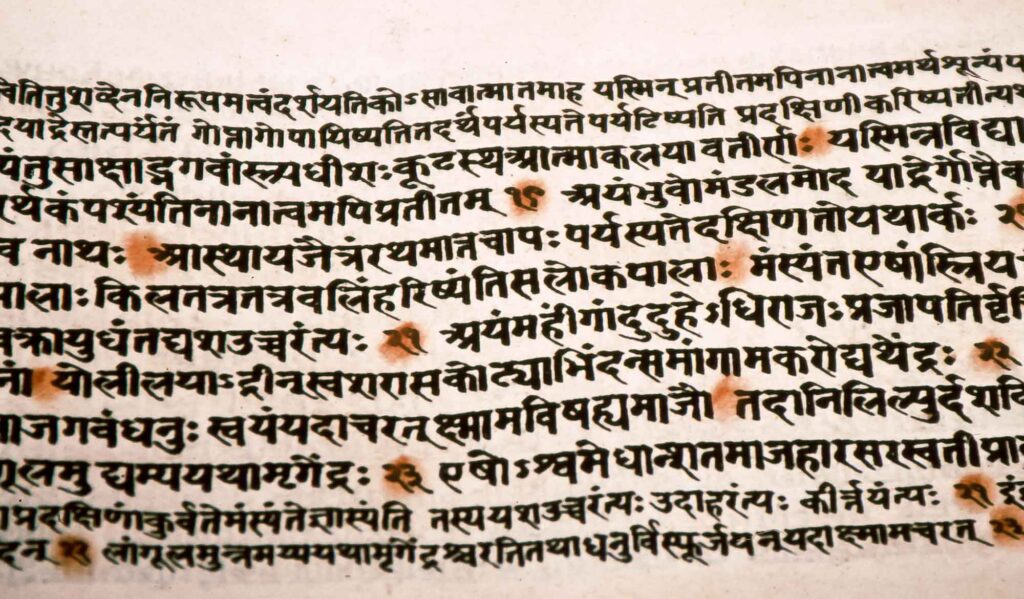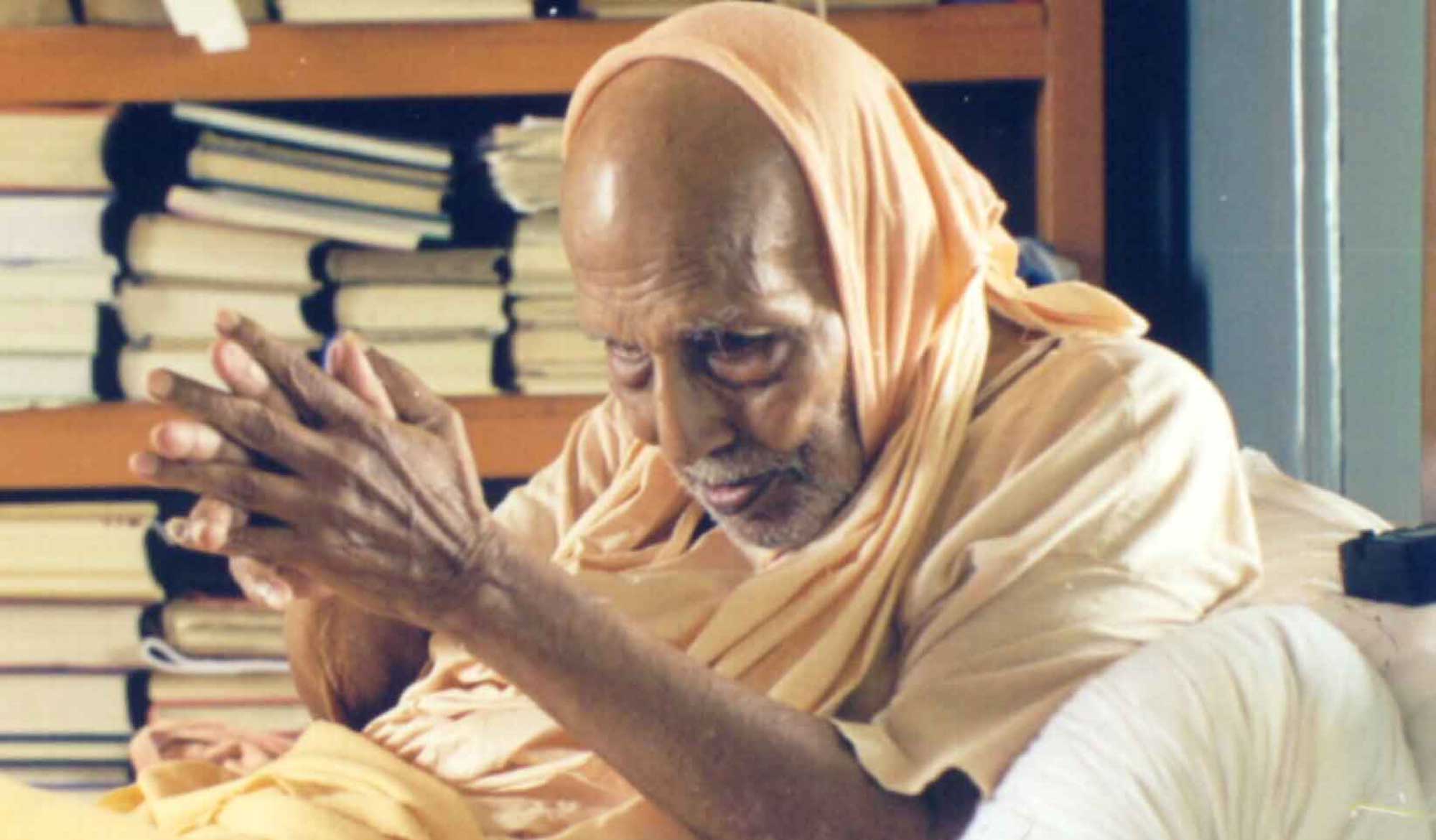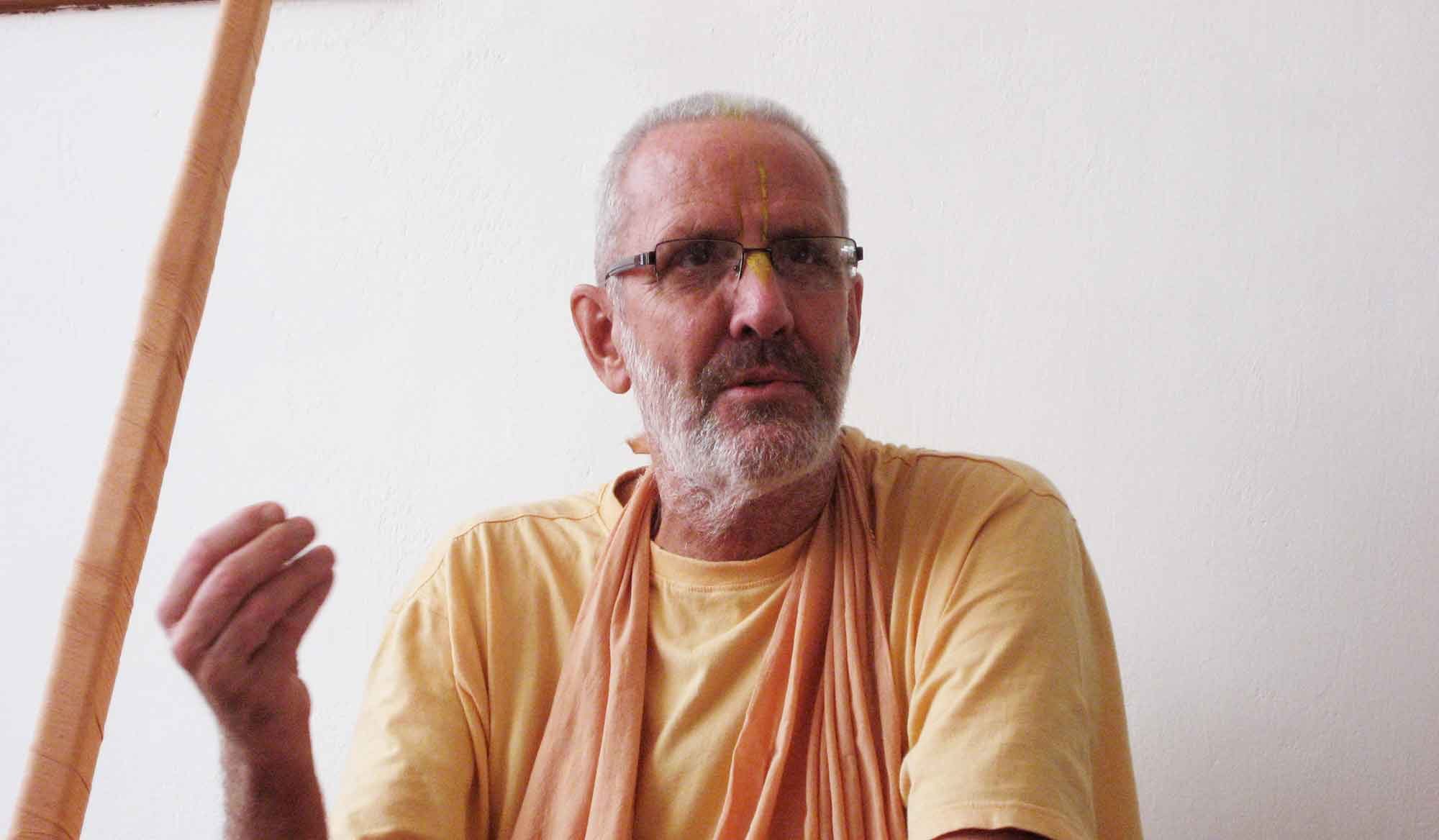by Swami B.G. Narasingha
“Hearing From a Rāsikācārya” was written in August 2000 by Śrīla Narasiṅgha Mahārāja. In this important article, Mahārāja explains how the previous ācāryas have warned immature sādhakas not to stray into ‘dangerous waters’ by gate-crashing into the higher līlās of Rādhā-Govinda. He also stresses the importance of anartha-nivṛtti and nāma-saṅkīrtana.
Listen to this article:
“Śrīla Viśvanātha Cakravartī Ṭhākura has mentioned that one should first come to the stage of anartha-nivrtti before attempting to hear the rāsa-līlā topics”
Question: Is it true that to make advancement in Kṛṣṇa consciousness one should hear from a rāsikācārya (a spiritual master advanced in relishing mellows of pure devotion) on the level of Viśvanātha Cakravartī Ṭhākura?
Answer: One who has lived in either Vṛndāvana or Navadvīpa for some time knows that the sahajiyā section is quite fond of this sort of explanation. But such emphasis is not entirely fact.
ācāryera mata yei, sei mata sāra
tāṅra ājñā laṅghi’ cale, sei ta’ asāra
“The order of the spiritual master is the active principle in spiritual life. Anyone who disobeys the order of the spiritual master immediately becomes useless.” (Cc. Ādi-līlā, 12.10)
Devotees who know the science of Kṛṣṇa consciousness have accepted the above verse as conclusive. This verse states the active principle in spiritual life, the key to spiritual advancement. If one pleases the spiritual master then one very quickly advances in Kṛṣṇa consciousness, but if one displeases the spiritual master by neglecting his order then one becomes asāra, or useless.
Śrīla Viśvanātha Cakravartī Ṭhākura in his commentary on the Bhagavad-gītā verse vyavasāyātmikā buddhir, ekeha kuru-nandana (2.41) states that it is the duty of a disciple to strictly follow the orders of his spiritual master. Viśvanātha writes as follows:
“The instructions that my Gurudeva has given me about śravaṇam, kīrtanam, smaraṇam, pāda-sevanam, etc. of Śrī Bhagavān are my very sādhana, my very sādhya and my very life. I am unable to relinquish them in either the sādhana stage or in sādhya. My single desire and only engagement is to follow them. Besides this, I have no other desire or engagement, even in my dreams. There is no loss for me, whether by following these instructions I attain happiness or misery, or whether my material life is destroyed or not.” (As translated and published by Gauḍīya Vedānta Samiti)
This is the open secret of success for advancement in spiritual life. One must have firm faith in the orders of the spiritual master and follow his orders wholeheartedly. The Vedas also confirm:
yasya deve parā bhaktir yathā deve tathā gurau
tasyaite kathitā hy arthāḥ prakāśante mahātmanaḥ
“The key to success in spiritual life is unflinching devotion to both the ācārya and Kṛṣṇa. To those great souls who have full faith in both Kṛṣṇa and the ācārya, the inner meaning of the Veda is fully revealed.” (Śvetāśvatara Upaniṣad 6.23)
It appears that many devotees are now confused about the process of advancement in Kṛṣṇa consciousness and think that simply by hearing rāsa-līlā from a so-called rāsika-guru that all their troubles will vanish. Perhaps this is an attractive proposal for those who are merely sentiment-mongers, but the serious candidate in Kṛṣṇa consciousness should know that sooner or later such discussion of rāsa-līlā in an unqualified assembly certainly leads to full-fledged sahajiyaism.
To support their claims of righteousness in hearing rāsa-līlā, the so-called rāsika-gurus of the sentiment mongers like to quote the following Bhāgavatam verse in support of their speculation:
vikrīḍitaṁ vraja-vadhūbhir idaṁ ca viṣṇoḥ
śraddhānvito ‘nuśṛṇuyād atha varṇayed yaḥ
bhaktiṁ parāṁ bhagavati pratilabhya kāmaṁ
hṛd-rogam āśv apahinoty acireṇa dhīraḥ
“A transcendentally sober person who, with faith and love continuously hears from a realized soul about the activities of Lord Kṛṣṇa in His rasa dance with the gopīs, or one who describes such activities, can attain full transcendental devotional service at the lotus feet of the Supreme Personality of Godhead. Thus lusty material desires, which are the heart disease of all materialistic persons, are for him quickly and completely vanquished.”
The statement made here, śraddhānvita is that one who has full faith will attain the Lord’s pure devotional service by hearing and chanting the Lord’s pastimes with the young gopīs. While commenting on this verse Śrīla Viśvanātha Cakravartī Ṭhākura has mentioned that one should first come to the stage of anartha-nivṛtti before attempting to hear the rāsa–līlā topics. It is sometimes taken that śraddhānvita or full faith means anartha–nivṛtti, the stage of being free from misconception and unwanted disturbances in the heart. In that stage one achieves bhaktiṁ parāṁ bhagavati, pure devotional service and hṛd-rogam the disease of the heart is vanquished forever.
When Kṛṣṇa kills a demon, that demon gets liberation and whenever Kṛṣṇa performs His pastimes of love, the perverted form of love, namely lust in the heart of the living entity, is also vanquished. Yet hearing the rāsa-līlā of Kṛṣṇa and His intimate love affairs with the gopīs is never recommended as a method of practice (sādhana) by anyone who actually knows the science of Kṛṣṇa.
Kṛṣṇa killed many demons before He manifested His pastimes of love with the gopīs. According to Śrīla Bhaktivinoda Ṭhākura, the demons killed by Kṛṣṇa represented various demoniac tendencies in the hearts of the living entities. Tṛṇāvarta represented the personification of argument; Vatsāura represented the form of boyhood offenses; Bakāsura represented the personification of cheating religion; Aghāsura represented the form of cruelty; Dhenukāsura represented the ass of blunt judgement; Kāliya represented the personification of malice and Pralambāsura represented the personification of impersonalism. All these demons were killed by Kṛṣṇa. Therefore, one should first rid one’s heart of those demoniac tendencies before attempting to hear the love affairs (rāsa–līlā) of Rādhā and Kṛṣṇa. It is only logical.
Śrīla A.C. Bhaktivedanta Svami Prabhupada has mentioned in his Bhāgavatam commentary (2.2.12) that unless one is freed from material sex desire, one should not read or hear topics past the second canto of Bhāgavatam. Śrīla Prabhupāda writes as follows:
“So purification means getting free gradually from sex desire, and this is attained by meditation on the person of the Lord as described herein, beginning from the feet. One should not try to go upwards artificially without seeing for himself how much he has been released from the sex desire. The smiling face of the Lord is the Tenth Canto of Śrīmad Bhāgavatam, and there are many upstarts who at once try to begin with the Tenth Canto and especially with the five chapters that delineate the rāsa-līlā of the Lord. This is certainly improper. By such improper study or hearing of Bhāgavatam, the material opportunists have played havoc by indulgence in sex life in the name of Bhāgavatam. This vilification of Bhāgavatam is rendered by the acts of the so-called devotees; one should be free from all kinds of sex desire before he tries to make a show of recital of Bhāgavatam. Śrī Viśvanātha Cakravartī Ṭhākura clearly defines the import of purification as cessation from sex indulgence. He says: yathā yathā dhīś ca śudhyati viṣaya-lāmpaṭyaṁ tyajati, tathā tathā dhārayed iti citta-śuddhi-tāratamyenaiva dhyāna-tāratamyam uktam. “And as one gets free from the intoxication of sex indulgence by purification of intelligence, one should step forward for the next meditation, or in other words, the progress of meditation on the different limbs of the transcendental body of the Lord should be enhanced in proportion to the progress of purification of the heart. The conclusion is that those who are still entrapped by sex indulgence should never progress to meditation above the feet of the Lord; therefore, recital of Śrīmad Bhāgavatam by them should be restricted to the First and Second Cantos of the great literature. One must complete the purification process by assimilating the contents of the first nine cantos. Then one should be admitted into the realm of the Tenth Canto of Śrīmad Bhāgavatam.”
It was also told to us by Śrīla B.P. Purī Gosvāmī Mahārāja that his Guru Mahārāja, Śrīla Bhaktisiddhānta Sarasvatī Ṭhākura, was very strict about reading or hearing even the baby pastimes of Kṛṣṇa, what to speak of reading or hearing the amorous pastimes of the Lord with the gopīs. Śrīla Bhaktisiddhānta Sarasvatī Ṭhākura as a method of practice never recommended such. Therefore, we find that the disciples of Śrīla Bhaktisiddhānta Sarasvatī Ṭhākura never indulged in such matters in the course of their preaching activities. Higher topics were always reserved for the most qualified devotees of the Lord. The pastimes of Rādhā-Kṛṣṇa were never taken to the public or to the ears of the neophyte devotees.
There is actually no difference between purely chanting Hare Kṛṣṇa and the pastimes of Rādhā-Kṛṣṇa save and except that chanting the holy name is the safer position. Therefore, it is advised that one should hear the holy name of Kṛṣṇa. Śrīla B.P. Purī Gosvāmī Mahārāja was also fond of saying, “Take full shelter of the holy name of Kṛṣṇa and there will be less commotion and more promotion.”
Just consider. If while still subject to sex desire one tries to hear the pastimes of Rādhā and Kṛṣṇa but fails to control the mind and at that point allows some unwholesome thought to enter, then a great offense will be committed. We have heard from Śrīla B.R. Śrīdhara Deva Gosvāmī Mahārāja that when such an offense is committed against the līlā of the Supreme Lord, the guardians of that plane will take note and the offender may be barred from entering there forever. Certainly this should be taken very seriously. To save us from such an unfortunate end, the recommended process to achieve purification is kṛṣṇa-kīrtana (chanting the holy name) and not smaraṇam (the process of remembrance of līlās).
Śrīmad Bhāgavatam, Śrīla Jiva Gosvāmī, Kṛṣṇa Dāsa Kavirāja Gosvāmī, Śrīla Bhaktisiddāanta Sarasvatī Ṭhākura, our Prabhupāda and many other stalwarts have all given stress to kīrtana as the most effective process for this age.
kaler doṣa-nidhe rājann asti hy eko mahān guṇaḥ
kīrtanād eva kṛṣṇasya mukta-saṅgaḥ paraṁ vrajet
“The age of Kali, the repository of all evils, has but one glorious characteristic; in this age, those who simply chant the holy name of Kṛṣṇa are liberated and reach the Supreme Lord.” (Bhāg. 12.3.51)
nāma-saṅkīrtanaṁ yasya sarva-pāpa praṇāśanam
praṇāmo duḥkha-śamanas taṁ namāmi hariṁ param
“Kṛṣṇa’s holy name can relieve us from all undesirable sinfulness, all filthy characteristics, and all miseries. Let us all bow down to Him.” (Bhāg. 12.13.23)
bhajanera madhye śreṣṭha nava-vidha bhakti
kṛṣṇa-prema ‘kṛṣṇa’ dite dhare mahā-śakti
tāra madhye sarva- śreṣṭha nāma-saṅkīrtana
niraparādhe nāma laile pāya prema-dhana
“Of all forms of divine service, nine forms are superior, which with great potency bestow upon devotees love of Kṛṣṇa, and their personal relationship with Him; and of the nine, the best is nāma–saṅkīrtana, the congregational chanting of the holy name. By offencelessly taking the holy name, the treasure of love for the Lord is attained.” (Cc. Antya 4.70,71)
Not only is the process of kīrtana recommended by śāstra (scripture), all other forms of devotional practice are subservient to kīrtana.
yadyapi anyā bhaktiḥ kalau kartavyā, tadā; kīrtanākhya-bhakti-saṁyogenaiva
“In the Kali-yuga, of the nine basic forms of devotional practices, the forms other than kīrtana certainly should be practiced, but they must be conducted subserviently to kīrtana.” (Bhakti-sandarbha, 273)
It may be argued that unless the holy name is chanted purely it will not have any effect whereas the pastimes of the Lord are immediately relishable and purifying. But this is a faulty argument. Even before the holy name is chanted purely it has a purifying effect. Nāmābhāsa is the stage of chanting before śuddha-nāma (pure chanting) is reached. Continuous chanting during the stage of nāmābhāsa gradually gives us promotion to śuddha–nāma.
The pastimes of the Supreme Lord are supra mundane and cannot be understood or relished by the mundane mind and senses which are covered with lust. Thinking of Rādhā and Kṛṣṇa when one is still a conditioned soul, what to speak of when one is suffering from sex desire, is more or less a dreamy thing. That is to say that such so-called neophyte meditation has no actual touch with the plane of reality in which Rādhā and Kṛṣṇa are situated. In other words, coming in contact with the līlā of Rādhā and Kṛṣṇa is not a thing of this world. One must cross many lower planes before coming to the transcendental platform.
upajiyā bāḍe latā ‘brahmāṇḍa’ bhedi’ yāya
‘virajā’, ‘brahma-loka’ bhedi’ ‘para-vyoma’ pāya
tabe yāya tad-upari ‘goloka-vṛndāvana’
‘kṛṣṇa-caraṇa’-kalpa-vṛkṣe kare ārohaṇa
“The creeper of devotion is born, and grows to pierce the wall of the universe. It crosses the Virajā River and the Brahman plane, and reaches to the Vaikuṇṭha plane. Then it grows further up to Goloka Vṛndāvana, finally reaching to embrace the wish-yielding tree of Kṛṣṇa’s lotus feet.” (Cc. Madhya 19.153,4)
This is the death-blow to the sentiment mongers. They want rāsa-līlā which is situated in the highest plane of divinity, but they want that experience through intellectual adjustment, not by paying the actual price. In the language of Śrīla Bhaktivinoda Ṭhākura such persons are known as pukūra-curiwāle, pond thieves.
We find that Śrī Caitanya Mahāprabhu would sometimes become absorbed in thoughts of the līlā of Kṛṣṇa. When the Lord came in contact with that plane of consciousness He manifested ecstatic symptoms such as trembling, faltering of the voice, and becoming unconscious. He would sometimes sweat blood, and His limbs would sometimes contract within His body. The Lord manifested these symptoms as a result of coming in connection with the transcendental plane. Śrīla B.R. Śrīdhara Deva Gosvāmī Mahārāja used to say:
“Only we are to conjecture the ideal. But if we think that we have got that, it is finished. We have got something else. It is such a thing, adhokṣaja. Any force of our mind or intelligence can never catch it. Avān mānasa gocara. It exists transcending our mental speculation and also the consideration of our judiciousness. But still it exists.”
Purification of the mind and senses is required if we want to progress to the transcendental plane and that purification is most substantially achieved by taking shelter of the holy name of Kṛṣṇa. That was the opinion of Śrī Caitanya Mahāprabhu.
ceto-darpaṇa-mārjanaḿ bhava-mahā-dāvāgni-nirvāpaṇaḿ
śreyaḥ-kairava-candrikā-vitaraṇaḿ vidyā-vadhū-jīvanam
ānandāmbudhi-vardhanaḿ prati-padaḿ pūrṇāmṛtāsvādanaḿ
sarvātma-snapanaḿ paraḿ vijayate śrī-kṛṣṇa-sańkīrtanam
“Let there be all victory for the chanting of the holy name of Lord Kṛṣṇa, which can cleanse the mirror of the heart and stop the miseries of the blazing fire of material existence. That chanting is the waxing moon that spreads the white lotus of good fortune for all living beings. It is the life and soul of all education. The chanting of the holy name of Kṛṣṇa expands the blissful ocean of transcendental life. It gives a cooling effect to everyone and enables one to taste full nectar at every step.”
Some gentleman has written in a recent publication that anyone who says that we should not listen to the narration of kṛṣṇa-līlā with the gopīs is certainly an atheist. But if we were to follow that line of thinking then even the mahājanas (great devotees) would have to be considered atheistic. The fact is that those with high regard for Divinity always deal with Divinity with the greatest caution, such that offense should not be committed. The neophytes should therefore not concern themselves with the narration of the līlās of Kṛṣṇa as much as they should concern themselves with the holy name of Kṛṣṇa. One should first surrender to the holy name. And if one is a disciple of a bona-fide spiritual master he should first concern himself/herself with the instructions of that spiritual master. That is the way of advancement in Kṛṣṇa consciousness.
More Articles by Swami B.G. Narasingha
A State of Utter Hopelessness
This article was written by Śrīla Narasiṅgha Mahārāja on the occasion of Śrīla Bhakti Pramoda Purī Gosvāmī’s Vyāsa Pūjā in 2002 wherein Mahārāja discusses the disappearance of Śrī Guru and how a true disciple feels in his absence.
Sādhana Bhakti
‘Sādhana Bhakti’ was written by Swami B.G. Narasingha in 1993. In this article, Narasingha Maharaja describes the five main divisions (aṅgas) of sādhana-bhakti as given by Śrīla Rūpa Gosvāmī in his Bhakti-rasāmṛta-sindhu.
Prasāda – Eating Our Way to Enlightenment
'Prasāda – Eating Our Way to Enlightenment' was written in 1990 by Swami B.G. Narasingha for Clarion Call magazine 3.4. Narasingha Maharaja explains what prasadam is and gives examples about the specialty of prasadām.













